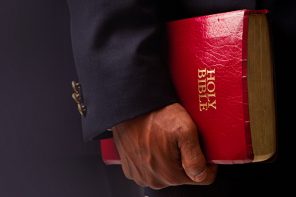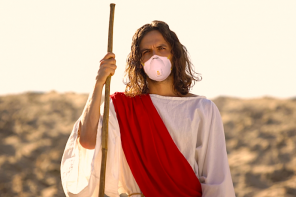Amid the onslaught of alarming news streaming (and in some cases, leaking) out of the White House, it’s hard to keep track of each new threat to democracy. But with President Trump’s Muslim ban followed closely by his pledge to “destroy” the Johnson Amendment, a clear theme has emerged in the Trump-Pence administration: “religious freedom” (for conservative Christians, at least) is top of the agenda.
Trump’s nomination on Wednesday of Judge Neil Gorsuch to the Supreme Court may seem like a reliably conservative choice—or even a relatively moderate selection, given the far-right bent of the rest of his picks. But despite some speculation that, if confirmed, a Justice Gorsuch would oppose some of Trump’s more extreme policies, attorneys working to defend the separation of church and state are worried.
To better understand the impact Gorsuch might have on the nation’s high court, RD spoke with Alex Luchenitser, associate legal director of Americans United for Separation of Church and State (AU). According to Luchenitser, AU is primarily concerned about Judge Gorsuch’s history of privileging “religious freedom” over civil rights.
Luchenitser pointed to two cases on which Gorsuch ruled in the 10th Circuit regarding the so-called contraceptive mandate under the Affordable Care Act (ACA). Before each case arrived at the Supreme Court, Gorsuch ruled in favor of Hobby Lobby Stores and Little Sisters of the Poor, arriving at a disconcerting conclusion that a “substantial burden on religious exercise” is whatever the petitioner says it is.
In Hobby Lobby Stores v. Sebelius, Gorsuch “voted that the religious objections of for-profit businesses should override the rights of women to receive contraceptive coverage,” Luchenitser explains. “And he actually wrote a separate concurrence that emphasized that he thought that the regulations substantially burdened the religious belief of the business owners,” to the extent that “any connection between the action of the owners and the prevention of development of a fetus” would constitute an impermissible infringement on the owners’ free religious exercise.
Similarly, Judge Gorsuch heard Little Sisters of the Poor v. Burwell before it reached the Supreme Court, and determined that the ACA regulation that required religious nonprofits to provide contraceptive coverage to employees through a third party was also an unacceptable burden on the nonprofit’s freedom of religion.
“What judge Gorsuch’s opinions in these contraceptive coverage cases signal is that he is likely to elevate the concerns or objections of religious objectors over civil rights in a wide variety of areas — not only [in] women’s healthcare, but also discrimination against customers or employees,” says Luchenitser. “For example, businesses who want to discriminate against LGBTQ people either in employment or deciding who they want to serve, based on religious reasons, would probably do fairly well before Judge Gorsuch. And we think that allowing religion to be used to justify inflicting harm on certain parties perverts the very concept of religious freedom.”
But among the much-circulated shortlist of Trump’s potential Supreme Court nominees, Gorsuch was notably the only jurist without a documented anti-LGBT record. That may be a simple matter of coincidence, since an LGBT-rights case never came before Gorsuch in the 10th Circuit. But that doesn’t mean recent legal gains toward LGBT equality would necessarily be safe under a Justice Gorsuch. Luchenitser pointed to a 2005 essay the judge wrote in the National Review Online, where he criticized progressives for relying on litigation “as the primary means of affecting their social agenda on everything from gay marriage to assisted suicide to the use of vouchers for private school education.” The piece, pointedly titled “Liberals ‘n Lawsuits,” argued that “American liberals have become addicted to the courtroom, relying on judges and lawyers rather than elected leaders and the ballot box.”
It’s an interesting argument to reconsider in the current historical moment, where, post-marriage equality and modest advances in legal trans rights, it has been conservatives who have turned to the court system to affect their social agenda. Both the aforementioned ACA cases on which Gorsuch ruled in favor of the religious objectors represent precisely that model of social change that Gorsuch criticized when used to progressive ends in 2005.
Luchenitser says there isn’t enough evidence in Gorsuch’s judicial record to assess whether he would privilege religious freedom complaints from Judeo-Christian plaintiffs over those brought by adherents of other faiths, but there is reason for concern about what Gorsuch considers state endorsement of a particular faith. In two separate cases, Judge Gorsuch has ruled that public displays of Christian iconography on public grounds do not constitute a formal endorsement of that faith.
Luchenitser offered the following background on those cases, which were both denials of en banc hearings at the 10th Circuit, where Gorsuch authored the dissent:
“In one case [Gorsuch] voted to uphold the display of a Ten Commandments monument on an Oklahoma county courthouse lawn, and he took the position that this Ten Commandments monument did not endorse religion, even though the person who donated it did so for religious reasons. There were religious rallies and ceremonies held when the monument was dedicated, and then to support maintaining the monument there, and then three of the county commissioners spoke at those events and made various public statements giving religious reasons for the display of this monument. And not withstanding all that evidence, Judge Gorsuch thought that this monument did not endorse religion.
“The other case was a case where the Utah Highway Patrol authorized the erection of 12-foot-tall crosses on public property, on the side of public highways, and prominent spaces to memorialize fallen troopers, as well as two crosses that were right at the headquarters of the highway patrol. And again, Judge Gorsuch thought that these crosses did not endorse religion, notwithstanding how large they were, how prominent they were, and the fact that they bore the symbol of the highway patrol, and also the fact that the highway patrol did not allow any other symbols but the cross to memorialize fallen officers.”
But the biggest cause for concern around Gorsuch’s opinion regarding state endorsement of religion comes from his own judicial questioning of whether such an endorsement should even be unconstitutional.
“It seems that Judge Gorsuch holds the same view as some of the other conservatives on the Supreme Court, which is that church-state separation is violated only when the government coerces citizens to participate in or support religion or its exercise,” says Luchenitser. If that position were adopted by a majority of the Supreme Court, it could have dire effects for the legal separation of church and state going forward, most directly impacting public schools, public events, and, as demonstrated in Gorsuch’s rulings on the Ten Commandments and highway patrol cross statues, the display of religious texts or iconography on public property.
Overall, Trump’s nomination of Neil Gorsuch fits neatly into the fast-emerging theme of this administration, which prioritizes religious freedom over other foundational pillars laid out in the First Amendment. Regardless of whether Senate Democrats make good on their vague threat to filibuster Gorsuch’s confirmation, it’s clear that the Trump-Pence administration is hell-bent on dismantling the separation of church and state.
Gorsuch might help expedite that process at the Supreme Court, but the destruction of that wall of separation seems almost as assured as the construction of Trump’s famed “border wall.”
In both cases, it seems likely that the ones “paying for it” will be…us.





